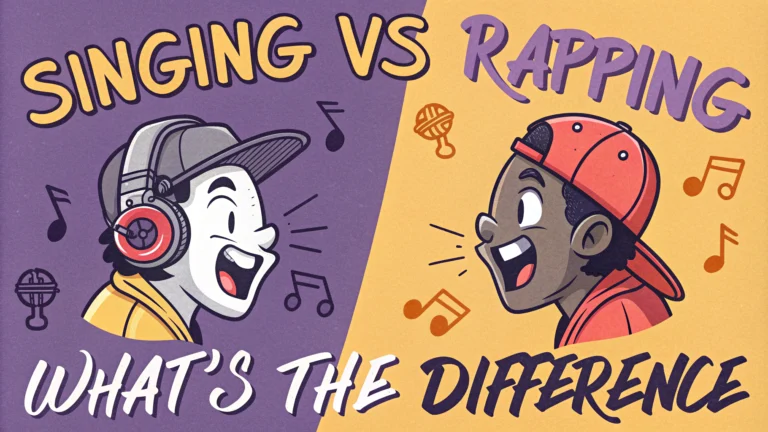Music fans often wonder about the technical differences between singing and rapping. These two vocal art forms share some common ground but require distinct skills and techniques.
The ability to distinguish between singing and rapping helps aspiring artists choose their path and develop the right techniques for their preferred style. Both forms tell stories and convey emotions, but they do so through different approaches to rhythm, melody, and vocal control.
Core Elements of Singing
Singing focuses on **melodic expression** and **pitch control**. The fundamental aspects include:
- Breath support and diaphragm control
- Vocal range development
- Pitch accuracy and tonal quality
- Harmony and scale navigation
Rap Fundamentals
Rapping centers on **rhythmic patterns** and **word manipulation**. Key components include:
- Flow and cadence mastery
- Syllable placement
- Word articulation speed
- Beat matching precision
Technical Differences
| Aspect | Singing | Rapping |
|---|---|---|
| Pitch Focus | High emphasis | Less emphasis |
| Rhythm Role | Supporting element | Primary focus |
| Voice Use | Sustained notes | Quick syllables |
Training Approaches for Vocal Artists
Different practice methods help develop specific vocal skills needed for each style:
**Singing Training:**
- Daily vocal warmups and breathing exercises
- Scale practice and pitch recognition drills
- Recording sessions for tone analysis
- Professional vocal coaching
**Rap Training:**
- Tongue twisters for articulation
- Metronome practice for timing
- Freestyle sessions
- Writing and memorization drills
Combining Singing and Rapping
Modern artists often blend both styles to create unique expressions. Notable techniques include:
- Melodic rap with pitch variations
- Sung hooks with rap verses
- Dynamic pace changes within songs
Professional Development
Each vocal path offers distinct career opportunities:
| Area | Singing Focus | Rap Focus |
|---|---|---|
| Performance | Concerts, musicals, choir | Hip-hop shows, battles |
| Studio Work | Session vocals, jingles | Ghostwriting, features |
| Teaching | Vocal coaching | Rap workshops |
Finding Your Voice
Consider these factors when choosing your vocal direction:
- Natural vocal qualities and strengths
- Musical preferences and genre interests
- Time commitment for skill development
- Local opportunities and market demand
> “The best artists know their strengths and develop their unique style rather than trying to copy others.”
Success in either field requires **dedication**, **practice**, and **authenticity**. Start with basic training in your chosen style and gradually expand your skills based on your goals and progress.
Singing vs Rapping FAQs
Q: What’s the main difference between singing and rapping?
Singing focuses on melodic pitch variation and sustained notes, while rapping emphasizes rhythmic speech patterns and word delivery. Singers follow musical scales, while rappers prioritize flow and timing.
Q: Do rappers need vocal training like singers?
While rappers don’t require traditional vocal training, they benefit from:
- Breath control exercises
- Rhythm training
- Diction practice
- Voice projection techniques
Q: Can someone be both a singer and rapper?
Yes. Artists like Drake, Anderson .Paak, and Lauryn Hill successfully combine both skills. This style is often called melodic rap or rap-singing.
Q: Which is harder to learn: singing or rapping?
Both require different skill sets. Singing demands natural pitch control and vocal range, while rapping needs precise rhythm and verbal dexterity. Neither is inherently harder – they’re just different.
Q: What equipment do singers and rappers need to start?
Basic equipment needs:
| Singers | Rappers |
|---|---|
| Microphone Audio interface Voice training apps |
Microphone Beat-making software Rhythm training tools |
Q: Is rapping considered singing in music theory?
No. Rapping is classified as rhythmic speaking or sprechgesang (speech-song), distinct from traditional singing which involves defined pitch patterns.
Q: Do rappers make more money than singers?
Income varies based on individual success, marketing, and business ventures rather than the style of performance. Top performers in both categories can achieve similar levels of financial success.
Q: What’s the difference in breathing techniques between singing and rapping?
Singers use diaphragmatic breathing for sustained notes, while rappers often use choppy breath control for quick word delivery and emphasis.
Q: Can singing help improve rapping skills?
Yes. Singing training can improve a rapper’s:
- Breath control
- Pitch awareness
- Vocal endurance
- Overall musicality
Q: What genres mix singing and rapping most effectively?
Popular hybrid genres include:
- R&B/Hip-Hop
- Pop-Rap
- Modern Trap
- Alternative Hip-Hop
Q: How do vocal warm-ups differ for singers versus rappers?
Singers focus on pitch exercises and scales, while rappers emphasize tongue twisters and speed exercises for articulation.



















